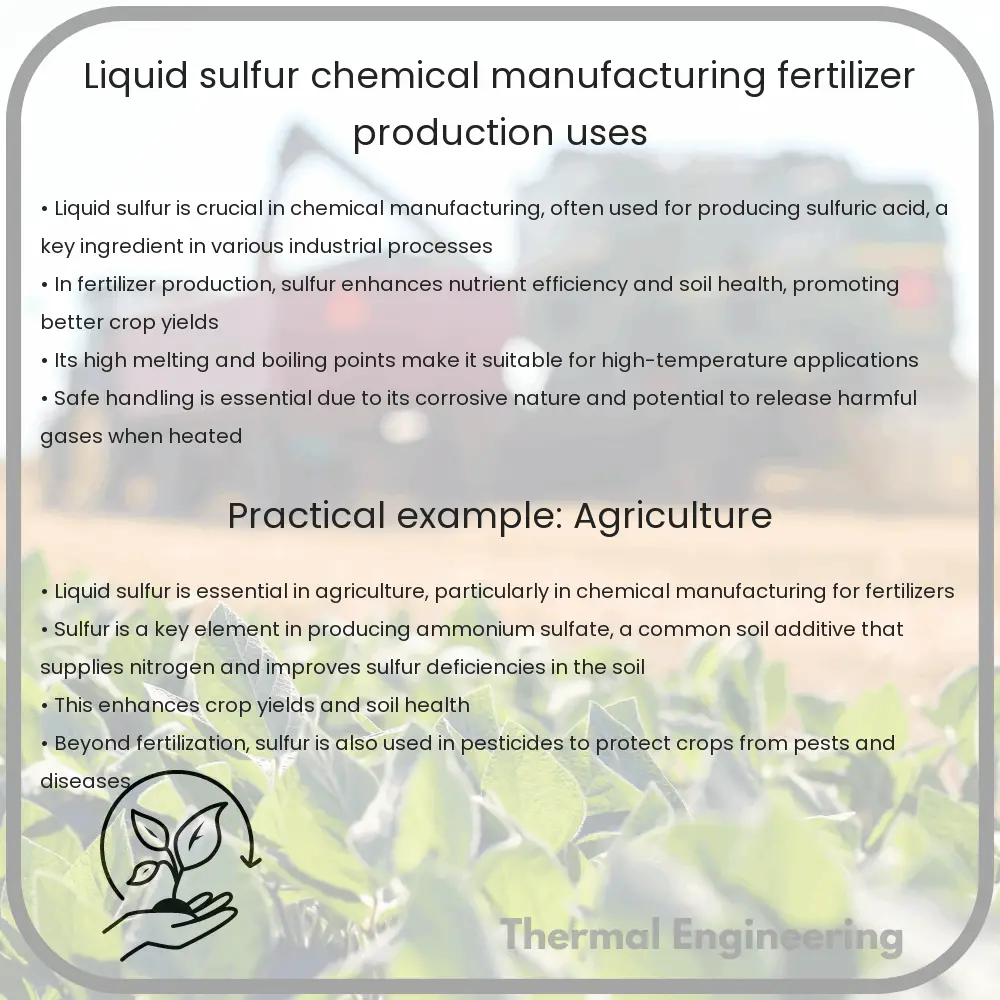Explore the use and challenges of liquid sulfur in chemical manufacturing and fertilizer production, detailing its properties, applications, and safety considerations.

Liquid Sulfur in Chemical Manufacturing and Fertilizer Production
Sulfur is a crucial element used in various industrial processes, particularly in chemical manufacturing and fertilizer production. In its liquid form, sulfur presents unique properties and challenges that make it particularly useful for these applications. This article provides a comprehensive overview of how liquid sulfur is used in these two critical sectors.
Properties of Liquid Sulfur
Liquid sulfur occurs when sulfur is heated above its melting point of approximately 115.21°C (239.38°F). It is known for its distinctive bright yellow color and its viscosity, which can vary significantly with temperature. As the temperature increases, liquid sulfur becomes less viscous until it reaches about 160°C, after which it becomes increasingly viscous again due to the formation of long polymeric sulfur chains.
Uses of Liquid Sulfur in Chemical Manufacturing
In chemical manufacturing, liquid sulfur is primarily used as:
- Sulfuric Acid Production: One of the most significant uses of sulfur is in the production of sulfuric acid (H2SO4), a critical component in various industries. The process begins with the burning of sulfur to produce sulfur dioxide (SO2), which is then oxidized to sulfur trioxide (SO3) in the presence of a catalyst. Sulfur trioxide is subsequently absorbed in water to yield sulfuric acid.
- Synthetic Rubber Production: Liquid sulfur is used in the vulcanization process to manufacture various types of synthetic rubbers. Vulcanization enhances the elasticity and durability of rubber by forming cross-links between polymer chains through the addition of sulfur.
Uses of Liquid Sulfur in Fertilizer Production
Liquid sulfur also plays a pivotal role in the production of fertilizers, where it is used as:
- Sulfur-Based Fertilizers: Elemental sulfur and sulfur compounds are essential for plant growth and soil fertility, making them key ingredients in fertilizer compositions. Sulfate forms of sulfur, such as ammonium sulfate ((NH4)2SO4), are particularly effective as plant nutrients.
- Phosphate Fertilizers: Sulfur is used in the production of phosphoric acid, which is a precursor to many phosphate fertilizers. The typical process involves the reaction of sulfuric acid with phosphate rock to produce phosphoric acid (H3PO4) and calcium sulfate (gypsum).
Challenges with Handling Liquid Sulfur
While liquid sulfur is extremely useful, handling and storing it poses several challenges:
- High Temperature: Maintaining sulfur in a liquid state requires high temperatures that can pose safety risks such as burns and fire hazards.
- Corrosiveness: When liquid sulfur comes into contact with certain materials, it can be highly corrosive, requiring specialized containment systems made of materials like stainless steel or certain alloys.
- Viscosity and Solidification: The varying viscosity of liquid sulfur can complicate pumping and transportation processes. Moreover, improper handling can lead to premature solidification, causing blockages and maintenance issues.
Conclusion
Liquid sulfur is an indispensable resource in the fields of chemical manufacturing and fertilizer production, owing to its roles in producing sulfuric acid, synthetic rubbers, and various fertilizers. However, the handling of liquid sulfur requires careful temperature and material considerations to ensure safe and efficient use. As industries continue to evolve, the demand for efficient and innovative methods to utilize liquid sulfur will likely increase, highlighting its ongoing importance in global manufacturing and agriculture.